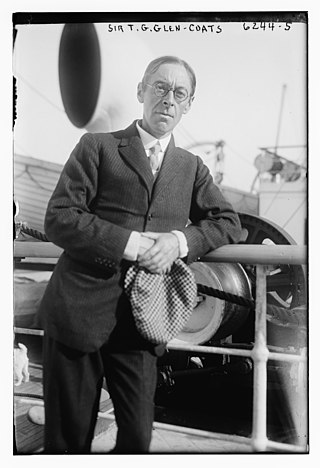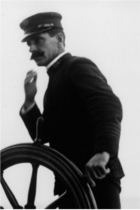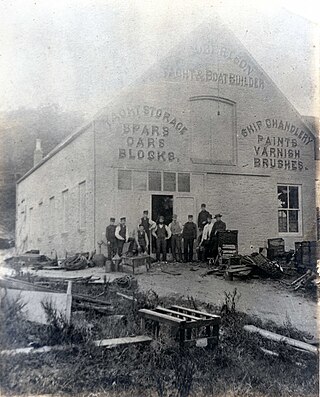
The River Clyde is a river that flows into the Firth of Clyde in Scotland. It is the ninth-longest river in the United Kingdom, and the second-longest in Scotland. It runs through the major city of Glasgow. Historically, it was important to the British Empire because of its role in shipbuilding and trade. To the Romans, it was Clota, and in the early medieval Cumbric language, it was known as Clud or Clut. It was central to the Kingdom of Strathclyde.
Sailing/Yachting is an Olympic sport starting from the Games of the 1st Olympiad. With the exception of the 1904 and the canceled 1916 Summer Olympics, sailing has always been included on the Olympic schedule. The Sailing program of 1908 was open for a total of five sailing classes (disciplines), but actually only four Sailing events were contested. The planned venue of all races, named matches, was Ryde, Isle of Wight.

The Dragon is a one-design keelboat designed by Norwegian Johan Anker in 1929. In 1948 the Dragon became an Olympic Class, a status it retained until the Munich Olympics in 1972. The Dragon's long keel and elegant metre-boat lines remain unchanged, but today Dragons are constructed using the latest technology to make the boat durable and easy to maintain. GRP construction was introduced in 1973 and the rigging has been regularly updated.

Rhu is a village and historic parish on the east shore of the Gare Loch in Argyll and Bute, Scotland.

Sir Thomas Coats Glen Glen-Coats, 2nd Baronet was a Scottish sailor who competed for the Royal Clyde Yacht Club in the 12-metre class at the 1908 Summer Olympics.
Arthur Drummond Downes was a Scottish sailor who competed for the Royal Clyde Yacht Club at the 1908 Summer Olympics.
John Henry Downes was a Scottish sailor who competed for the Royal Clyde Yacht Club at the 1908 Summer Olympics.
John Buchanan was a Scottish sailor who competed for the Royal Clyde Yacht Club in the 1908 Summer Olympics.
Thomas Gerald Tait was a Scottish sailor who competed for the Royal Clyde Yacht Club at the 1908 Summer Olympics.
James Clark Bunten was a Scottish sailor who competed for the Royal Clyde Yacht Club at the 1908 Summer Olympics.

His Majesty's Yacht Britannia was a gaff-rigged cutter built in 1893 for RYS Commodore Albert Edward, Prince of Wales. She served both himself and his son King George V with a long racing career.

Charles Barr, was an accomplished sailing skipper who three times captained winning America's Cup yachts.

Hunters Quay is a village, on the Cowal peninsula in Argyll and Bute, Scottish Highlands. Situated between Kirn to the south and Ardnadam to the north, Hunters Quay is the main base of Western Ferries, operating between Hunters Quay and McInroy's Point.

Alexander Robertson & Sons was a boatyard in Sandbank, Argyll and Bute, Scotland, from 1876 to 1980. The yard was located on the shore of the Holy Loch, not far from the Royal Clyde Yacht Club (RCYC) at Hunters Quay, in the building that is now the Royal Marine Hotel, which was the epicentre of early Clyde yachting. Alexander Robertson started repairing boats in a small workshop at Sandbank in 1876, and went on to become one of the foremost wooden boatbuilders on Scotland's River Clyde. The "golden years" of Robertson's yard were in the early 1900s, when it started building some of the first IYRU 12mR & 15mR racing yachts. Robertson's was well known for the quality of its workmanship and was chosen to build the first 15-metre yacht designed by William Fife III. More than 55 boats were built by Robertson's in preparation for the First World War and the yard remained busy even during the Great Depression in the 1930s as many wealthy businessmen developed a passion for yacht racing on the Clyde. During World War II the yard was devoted to Admiralty work, producing a wide range of large high-speed Fairmile Marine Motor Boats. After the war, the yard built the successful one-class Loch Longs and two 12-metre challengers for the America's Cup: Sceptre (1958) and Sovereign (1964). Due to difficult business conditions, the Robertson family sold the yard in 1965, and it was turned over to glass-reinforced plastic production work until it closed in 1980. During its 104-year history, Robertson's Yard built 482 numbered boats, many of which are still sailing today.

James Cleland Burns, 3rd Baron Inverclyde, was the second son of John Burns, the first Lord Inverclyde, and grandson of Sir George Burns, 1st Baronet, a founder of the Cunard Line. James Burns succeeded to the title of Baron Inverclyde on the death of his elder brother, George Burns, in 1905.

George Lennox Watson was a Scottish naval architect. Born in Glasgow, son of Thomas Lennox Watson, a doctor at the Glasgow Royal Infirmary, and grandson of Sir Timothy Burstall, engineer and entrant at the 1829 Rainhill Trials.
Events from the year 1856 in Scotland.
Meadowside was a football ground in the Partick area of Glasgow, Scotland. It was the home ground of Partick Thistle from 1897 until 1908.

The Royal Marine Hotel is a hotel located on Marine Parade in Hunters Quay, Argyll and Bute, Scotland. It is a Category B listed building, opened in 1890 after the original 1856 building, named Marine Hotel, was gutted by fire. Its architect was Glasgow's Thomas Lennox Watson. The new construction received royal patronage in 1872.













